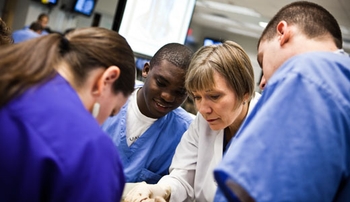It’s a story that makes Carol Lomneth, Ph.D., smile.
LifeNet technicians were able to save a life during an emergency with an intubation technique they had recently learned and practiced on lightly embalmed cadavers in the UNMC Advanced Anatomy Lab.
 |
Carol Lomneth, Ph.D. |
More like real patients
The lightly embalmed cadavers in the Advanced Anatomy Lab are prepared in a way that makes them more lifelike than the traditionally embalmed cadavers used by students in the Gross Anatomy Lab.
Lightly embalmed cadavers have softer tissues and more flexible joints, similar to the patients health care professionals treat. This makes lightly embalmed cadavers useful for practice of procedures such as intubations and surgeries, Dr. Lomneth said.
Program growth
After starting with four lightly embalmed cadavers in 2003, UNMC now has 30 in the Advanced Anatomy Lab.
The lab’s clientele also has grown significantly from 18 users in 2003 to more than 800 last year, Dr. Lomneth said.
Research and teaching applications
UNMC residents and clinicians have used lightly embalmed cadavers extensively to sharpen their clinical skills. In the future, Dr. Lomneth wants to see the cadavers used more for research and the development of new teaching and surgical techniques.
“The Advanced Anatomy Lab is a powerful resource for people throughout campus and we have plenty of room to find new ways to use it,” Dr. Lomneth said.